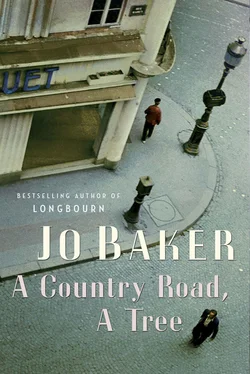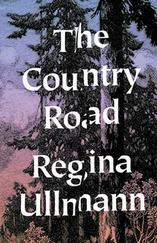She fakes a shiver, says, “It is getting rather chilly, don’t you think?”
He colludes in the deceit. Speech still sounds strange and wet from his reordered mouth: “Shall I fetch you your shawl?”
“Lily can get it. I’ll call her.”
“No need.” Hands on knees, he’s pushing up to his feet.
“In my room, then. On the dresser.”
Beyond the stuffy electric heat, the hall is cool. He switches on the light, still uncertain of his way. He treads along to her door and pushes it open. The light from the hallway streaks past him and casts his shadow on the carpet. He flicks the bedroom light-switch and the shadows bolt.
The quilted coverlet is tugged square and straight, valance skirts brush the floor; the curtains hang in tidy folds, undrawn; the panes of glass reflect the room back at him. Her shawl lies folded neatly on the dressing table. As he moves towards it, his reflection in the window ambles up to meet him, faithful as an old hound. Long limbs, smoothed hair, glinting glasses, creased slacks. He lifts the shawl and his image copies him. He turns his back on it, lopes away. At the bedroom door, he switches off the light and glances back.
His image has vanished from the uncurtained window. Reflected there now is the bright oblong of the doorway and his blank silhouette within it; through the darkened glass he can see out across the garden and over the hedge, and on the far side of the street to the topmost storey of Cooldrinagh. The sky is filled with prickling stars; and up there, the nursery casement glows, and inside a child is perhaps kneeling to say his prayers. He watches the weave of larch branches as they stir across the light; he watches the lace they make.
And then the blind is drawn down over there, and the warm nursery is cut off, and all that remains is the pool of night that swells between the old house and the new. And his silhouette, angular and black and blank, framed by the bright doorway.
There is nothing grand about it; no waves, no wind, no briny spray. The world is not and never was in sympathy with him, nor with anybody else. But this is the moment when everything changes, the moment when the wide chaotic chatter and stink of it, all that wild Shem-beloved hubbub, falls away, and his eyes are trained on darkness and his ears on silence. On that stark figure, framed there on the threshold, unknowable and his.
He turns away. He closes the bedroom door behind him. He switches off the hall light: his fingertips trace along the wall, his heart racing.
He can find his own way now, in the dark. He doesn’t need the light.
CHAPTER NINETEEN NORMANDY, August 1945
Cherbourg is grey under the blue August sky; the coastline is encrusted with buildings like a rock-pool is with limpets. He leans against the railing, peering out.
All the crates and boxes, the equipment and supplies he had received, unpacked, repacked, stored and accounted for in the warehouse back in Dublin — the bandages, tinned ham, syringes, soap and cigarettes — are now nearing their destination. It had seemed abstract for so long, too big to conceive. He had focused on the parts and not the whole: all these months in the warehouse, with every labelled parcel stacked on every numbered shelf, with every crate he’d nailed shut and wheeled into its own exact spot in the stores, he had kept from his mind the vastness of the undertaking. It had been, simply, a way to get back to France.
But now, with landfall, that sense of his own desire crumbles and he absorbs an understanding of the work that is to be done.
The ship churns in past the harbour walls: the damage here seems geological. Those tumbled boulders, that rust-streaked stone, all of it massive and massively broken, as though it were the wear of centuries, of millennia of weather, as though it were the shrug of tectonic plates.
The quayside, when they reach it, is a lunatic forced into a straitjacket: chaos twitches beneath the surface and wriggles out around the edges. Rubble has been swept back; there are drifts of broken brick and stone and bent steel and copper piping and splintered beams. Work weaves around it all, between the temporary wooden huts and the idling trucks and the remains of the railway line, as if this were quite reasonable, as if the broken and twisted crane lying half in, half out of the water were just part of the natural scenery of this place, and the box car hanging with the ground gone from underneath it, the rails twisted across a crater, sleepers splintered, had somehow just grown there like a buddleia from the gaps between the stones.
He creeps down a swaying gantry. On the dockside he just stands as others jostle by him. He is overwhelmed by the rank smell of broken drains and diesel fumes, by the powdered brick under his feet, by the heaps of rubble and the carious bits of wall like broken teeth.
A hand clasps his shoulder.
“If you think this is bad,” Alan says, “just wait till you see Saint-Lô.”
He grimaces. He fishes out his cigarettes. He does not see how anything could be worse than this and still be. He lights up and struggles to fit himself back into himself. His boots are wrong. His tunic, trousers, puttees, are all wrong. He feels his eyeballs when he blinks. The world is in flitters, in bits and shreds. He has to work out how he can be in it, and move through it, again.
Alan beckons him along. He does his best to arrange his face.
“There’s a lift waiting for us,” Alan calls. “Come along, old son. Chop chop.”
—
He can see it in his mind’s eye, the dot dot dot of their progress across the map, as he sits in the back of the car, the wind in his eyes, the dust crunching between his remaining teeth. He does not have to do anything but wait. Crossing the French countryside like this, at thirty, thirty-five, forty miles an hour — watching the speedometer over the driver’s shoulder, the needle ticking upward even while the driver veers round potholes and rattles over the rough — changes everything, so that thistles and teasels are a dotted blur, and the stands of Queen Anne’s lace are brief pale clouds; on foot, he’d have seen them grow from a distant haze to up-close snowflake precision. A burned-out tank stands in a field, sooty and scorched and grown around with this summer’s nettles. And then it’s gone.
“You all right there?”
“What?” he has to yell over the noise of the car.
“You all right?”
He nods, turns back to the window. They thunder through a settlement — church-café-crossroads-and-it’s-gone. He’s left with an image of blowsy overblown roses, rank grass, charred beams, a crow perched on a fencepost, an empty window frame like a crucifix.
Then they’re out, and they rumble over a Bailey bridge, and there’s a flash of blue sky-reflecting water, and he glances off and up along the river and through the wide emptiness of the Normandy landscape, which manages somehow to be at once lush and bleak. He fishes for his cigarettes.
He holds the packet out to Alan, who takes a cigarette, eyes narrowed in the bright sun. He taps the driver’s shoulder, holds the pack for him to see. The driver shakes his head. There are two hundred miles or so between Cherbourg and Saint-Lô. They sit and smoke past deserted towns and farmhouses and neglected fields and burned-out barns and abandoned gear, and nobody talks. The emptiness gets inside him, like the cold.
—
A bank of cloud slid in overnight, while they slept, comfortable and oblivious, at their digs outside town; this new morning feels more like November than August. As they drive in through the dripping green, the damp makes his chest tighten; a cigarette soothes, and there are more cigarettes, cartons of them, crates. For once he can be certain, thanks to the generosity of Gallahers, that he will not run out of cigarettes.
Читать дальше










